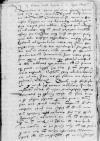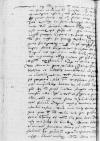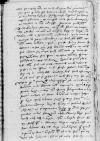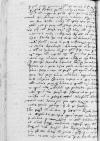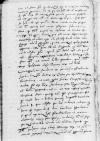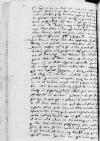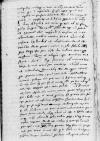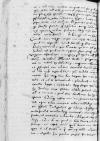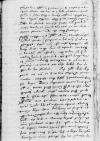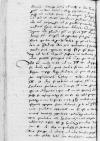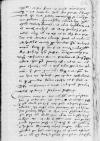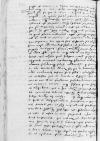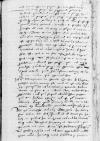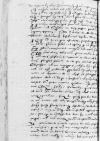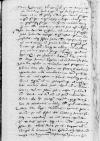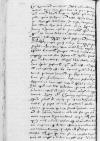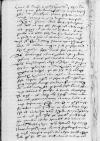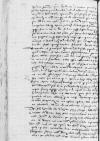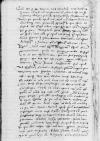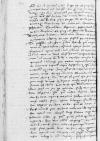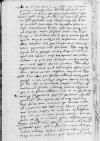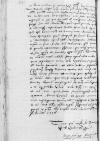⌊⌋ tuae ms. tuas(!)
⌈tuaetuae ms. tuas(!)
⌉ VI-a Decembris ⌊Bruxellis⌋ datae ms. datas(!)
⌈dataedatae ms. datas(!)
⌉, ⌊fratri⌋ meo, tuo olim Burgensi commilitoni, ab ipso mercatore ⌊S written over ...⌈... illegible⌈...... illegible⌉SS written over ...⌉tanislao Czipser⌋, cui eas deferendas credidisti, XV-a huius mensis[1] sunt redditae. ⌊⌋ cum accepissem et ad calcem usque non semel perlegissem, incredibili affectus sum voluptate neque mihi temperare potui, quin tibi e vestigio responderem, misique istas ⌊Gdanum⌋ ad ⌊contribulos⌋ meos, ut quantum fieri posset citius, ad te tuto pervolarent, fore sperans diu eas in itinere, modo commoda se offerat oportunitas, non immoraturas. Iam ⌊⌋, quas hinc XXIII Decembris opera ⌊gentilium⌋ meorum ad te dedi, redditas esse arbitror. ⌊⌋ non parva ex parte ⌊⌋ tuis, si recte perpenderis, respondi, nihilotamen secius adnitar rescribere tibi ad omnia, quantum res ipsa scientia tua digna postulare videbitur.
Gratum mihi fecisti plurimum, quod me de his certiorem reddideris, quae in ⌊Monasteriensi civitate⌋ cum misero ⌊anabaptistarum rege⌋ et ⌊Bernardis⌋ eius complicibus egisti. Non facile eos a se Sathan separari permittit, quos in ditionem suam totos semel ms. ll(!)
⌈ll ms. ll(!)
⌉ accepit.
Quod autem ⌊Antverpiam⌋ et ad tuos sospes cum communi nostro amico domino ⌊Gotscalco⌋ redib redieris, fuit mihi oppido quam gratissimum. Oblectavit me etiam non vulgariter, quod tu cum amicis et praesertim domino ⌊Vito Herle⌋ mei memineri<s> et, quo gratius mihi nihil esse potuit, quod domi omnes recte valere offenderis, ⌊Ascanium⌋ imprimis illum tuum crassiusculum, quem ut tibi quam diutissime
 UUB, H.155, f. 197v
vivat teque multis virtutibus cum aetate ornatus, te, inquam, iam senem et decrepitum, honestet omnique gaudio et voluptate afficiat, vel felicem avum, si non episcopi patrem faciat, ex animo faveo et ad a Deo precor. ⌊Coniugi⌋ tuae, feminae virtuosissimae dulcique, nostro amico domino ⌊Laurino⌋ decano omnibusque nostris, quos nosti, amicis opto fausta omnia.
UUB, H.155, f. 197v
vivat teque multis virtutibus cum aetate ornatus, te, inquam, iam senem et decrepitum, honestet omnique gaudio et voluptate afficiat, vel felicem avum, si non episcopi patrem faciat, ex animo faveo et ad a Deo precor. ⌊Coniugi⌋ tuae, feminae virtuosissimae dulcique, nostro amico domino ⌊Laurino⌋ decano omnibusque nostris, quos nosti, amicis opto fausta omnia.
Pro novis et felicissimis successibus ⌊caesaris⌋, in quorum exspectatione non sine magno fui hucusque desiderio, quam possum, gratias habeo, utque me semper de iis copiosissime participem facias, vehementer te obsecro. De iis, quae apud nos aguntur, in calce litterarum vicissim tibi impartiam nihilque omittam, quod scientia tua dignum existimabo.
Quod, ut scribis, apud vos secura in pace vivatur, quantumvis ⌊Dani⌋, ⌊Holsatae⌋ et ⌊Lubecenses⌋ tumultuentur ms. tumultuentium(!)
⌈tumultuenturtumultuentur ms. tumultuentium(!)
⌉, non parum me oblectavit. Utinam vobis securitas et pax illa sit perpetua, solet enim tempestatem summa praecedere tranquillitas. Vereor, ne ob mortem ⌊Roffensis⌋, quam Deus non sinet inultam, ⌊Anglia⌋ aliquid monstri alat, quod a vobis et ⌊Hispanis⌋ per ⌊⌊Alcidem⌋ vestrum⌋[2], cuius ⌊amita⌋ satis inhumaniter ob pellicatum habetur et apud ⌊Anglos⌋ tractatur, trucidandum restat. Unde novi motus excitari possent, quos tamen non velim, nisi pro publica orbis Christiani et vestrum omnium pace fieri.
cf. Vulg. Ps (G) 7:12:1 Deus iudex iustus; Vulg. 1Th 4:6:3 vindex est Dominus ⌊Deus iustus erit iudex et vindexcf. Vulg. Ps (G) 7:12:1 Deus iudex iustus; Vulg. 1Th 4:6:3 vindex est Dominus ⌋. ⌊Danos⌋, ⌊Holsatas⌋ et ⌊Lubecenses⌋ formidine ductos ad
ill(ustrissimum) or ill(ustrem)⌈ill(ustrissimum)ill(ustrissimum) or ill(ustrem)⌉
⌊ducem Fredericum⌋ comitem palatinum respicere incipientes oratoresque misisse libenter intellexi. Dominus Deus eum
 UUB, H.155, f. 198r
det principibus animum, ut tandem ad concordiam convertantur, sine qua, quod bella ipsa declarant, homines redduntur peiores et crudeliores bestiis.
UUB, H.155, f. 198r
det principibus animum, ut tandem ad concordiam convertantur, sine qua, quod bella ipsa declarant, homines redduntur peiores et crudeliores bestiis.
Quantumque mihi dissidium hoc ⌊Daniae regu{u}m⌋ placuerit, ex ⌊⌋ abunde accepisti et, ut reor, in animum admisisti. Praeterea, quid <de> ill(ustrissimo) or ill(ustri)⌈ill(ustrissimo)ill(ustrissimo) or ill(ustri)⌉ ⌊duce Friderico⌋ sentiam et quam illi fortunarum accessionem non invideam, ut etiam eum ditissimorum regnorum regem esse velim, modo a conflictationibus abstineatur, quibus mutuis commerciis non parum incommodatur et totum hoc vestrum ac nostrum ⌊mare⌋ reddetur infestum. Quae si diutius durare debebunt, nescio, quibus plus detrimenti, vestrisne ms. vestris ne(!)
⌈vestrisnevestrisne ms. vestris ne(!)
⌉, an nostris, sint allaturae. Sine cervisia quidem nostra credo, quod vivere possitis, ceterum sine pane, cuius copia vestratibus hinc subministratur, vos videritis.
Scribis, quo in statu res vestrae sint, ut eas vicinis meis referre possim. In eo gratum mihi fecisti plurimum, verum longe secus, atque tu edoctus es, tractatus hos factos esse accepi ab iis etiam, qui se profitentur certam harum rerum habere scientiam - utpote quod in pactis illis clare expressum sit, ut si ⌊ducatus Holsaciae⌋ aut ⌊Dania⌋
bell(is) or bell(o)⌈bell(is)bell(is) or bell(o)⌉
vexaretur, quales suppetias ⌊caesarea maiestas⌋ ratione domus Burgundiae cuilibet partium mittere et ferre debetur et vicissim. Item quod ⌊caesarea maiestas⌋ tolerare posset, quod unus serenissimi olim ⌊Frederici⌋ Danorum regis ⌊filiorum⌋ in paternum solium eligeretur et susciperetur. Insuper, quod annua pensio quattuor milium flor(enorum) praesenti electo ⌊Danorum regi⌋, cum nondum electus esset, a ⌊caesarea maiestae⌋ inscripta, ⌊seniori fratrum ms. fratri(!)
⌈fratrumfratrum ms. fratri(!)
⌉⌋ eius, postquam ipse in ⌊Danorum⌋ regem assumptus esset, cedere deberet. Ex iis longe aliud liquet, quam quod in praesentiarum quaeritur. Cuperem tamen et a te scire, quomodo ex vero ista habeant. Sit or Fit⌈SitSit or Fit⌉ in iis rebus plerumque, ut solet,
 UUB, H.155, f. 198v
quod cf. Adagia 1401 Spartam nactus es, hanc orna ⌊suam quisque ⌊Spartam⌋, quantum potest, eruatcf. Adagia 1401 Spartam nactus es, hanc orna ⌋.
UUB, H.155, f. 198v
quod cf. Adagia 1401 Spartam nactus es, hanc orna ⌊suam quisque ⌊Spartam⌋, quantum potest, eruatcf. Adagia 1401 Spartam nactus es, hanc orna ⌋.
Impingis nobis, quod partes ⌊Holsatae⌋ pecunia, navibus et milite iuverimus, quodque ob id non magnas gratias apud palatinos simus meriti. Unde ista habeas et quibus auctoribus, summopere a te certior fieri desidero, mallemus enim optimorum istorum principum gratiam, etiam si parum nobis prodesse possit, quamquam vix usi sumus vel forsan utemur, quam illorum ullam, quod nos sciamus interv<en>iente causa, indignationem. Quod autem, ut nos excuses, praetendis hoc nos fecisse ad ⌊Lubecensium⌋ compescendum furorem, amice tu quidem interpretaris et apud alios, ut scribis, depraedicasti debeturque tibi ob hoc officium a nobis, et habetur non parva gratia, praecipue vero, quod serenissimum ⌊regem nostrum⌋, cuius tibi cognitam commendas prudentiam, invitum cogi ad arma asseris nullaque re minus delectari, quam principum fovendis discordiis. Cumque hoc certo scias, praeterea et in quos usus pecuniae et milites nostri converti solent, satis mirari non possum, quomodo eiusmodi ad vos fama vel potius rumor advolarit teque ad ea credendum induxerit. Quocirca impense a te peto, ut eos calumniatores potius quam delatores ex nomine mihi declares, ne apud nostros confictum esse putaretur, quod ad eum modum apud vos sparsum est.
cf. Pl. Truc. 792 ⌊Infitias non eocf. Pl. Truc. 792 ⌋, quod et in ⌊⌋ ad te perscripsi, magnificum ⌊marchionem Albertum⌋ vicinum meum ⌊sororio suo⌋ pro affinitatis iure, quibus modis potuit, consuluisse. Sed de iis hactenus.
Non possum non laudare, quod serenissima ⌊regina Maria⌋, ut dissidentes principes componere posset, med{r}iatricem se obtulerit. Quod vero illustrissimus, ut scribis, ⌊Holsaciae dux⌋ eam oblationem suscipere recusaverit, responsum ipsius domini ducis ad litteras serenissimae dominae ⌊reginae⌋ ⌊Mechliniae⌋ XXVII Iulii praesenti anni datas non continet. Quandoquidem in eo habetur, ut certo mihi relatum est, quod se ⌊dux ille⌋ offert
 UUB, H.155, f. 199r
immo et ferre potest, quod ⌊serenitas eius⌋ tractet amicabilesque tractatus proponat, modo tempus et locum ad id constituat, quo ipse dux cum amicis suis commode convenire possit. Ad eam propensionem nihil ⌊illi⌋ fertur esse responsum. Quae si sic se habent, non est, quod in ⌊duce⌋ merito causari possit, non tamen excuso vel accuso quempiam. Idem et in eo facio, quod scribis ⌊caesarem⌋ ex ⌊Aphrica⌋ et ⌊Sicilia⌋ commisisse, ut operam daretis, qua omnia amice componerentur, reiectamque ab altero esse eam condicionem, unde alteri non superesse aliud, quam quantum aequitate, amicis et opibus possit experiri. De iure iam non disputo, cuius ratione vivente adhuc ⌊patre⌋, apud quem totum est, si quid est, istiusmodi experientia intenditur. Verum, q(uod) iuste fieri p(otes)t, ut novum bellum geratur, cum illustrissimus ⌊dux Holsati written over e⌈eii written over e⌉ae⌋ electus ⌊Danorum⌋ rex ad litteras ⌊comitis palatini Frederici⌋ ex ⌊Heidelbergk⌋ ultima Septembris praeteriti datas ex castro suo ⌊Gotdarff⌋ XVI Novembris, ut certo compertum habeo, rescripserit, quibus modis pater eius ⌊rex Fredericus⌋ pro ⌊regno Daniae⌋ et bellum gesserit, et in eo rex effectus ultimum clauserit diem, quaque ratione ipse successerit, et quod causa haec in ⌊iudicio camarae imperialis⌋ tractata fuerit, in qua adhuc pendet indecisa, ad eamque denuo se respondend(o) ⌊duci Frederico⌋ palatino, si quid aequitatis habere praetendit, immo et coram electoribus aliisque principibus, iudicibus tamen non suspectis submittit. Unde non obscuro liquet, quod illustrissimus ⌊Holsatiae dux⌋ electus ⌊Danorum⌋ rex non solum amicam compositionem, verumetiam iuridicam cognitionem ferre
UUB, H.155, f. 199r
immo et ferre potest, quod ⌊serenitas eius⌋ tractet amicabilesque tractatus proponat, modo tempus et locum ad id constituat, quo ipse dux cum amicis suis commode convenire possit. Ad eam propensionem nihil ⌊illi⌋ fertur esse responsum. Quae si sic se habent, non est, quod in ⌊duce⌋ merito causari possit, non tamen excuso vel accuso quempiam. Idem et in eo facio, quod scribis ⌊caesarem⌋ ex ⌊Aphrica⌋ et ⌊Sicilia⌋ commisisse, ut operam daretis, qua omnia amice componerentur, reiectamque ab altero esse eam condicionem, unde alteri non superesse aliud, quam quantum aequitate, amicis et opibus possit experiri. De iure iam non disputo, cuius ratione vivente adhuc ⌊patre⌋, apud quem totum est, si quid est, istiusmodi experientia intenditur. Verum, q(uod) iuste fieri p(otes)t, ut novum bellum geratur, cum illustrissimus ⌊dux Holsati written over e⌈eii written over e⌉ae⌋ electus ⌊Danorum⌋ rex ad litteras ⌊comitis palatini Frederici⌋ ex ⌊Heidelbergk⌋ ultima Septembris praeteriti datas ex castro suo ⌊Gotdarff⌋ XVI Novembris, ut certo compertum habeo, rescripserit, quibus modis pater eius ⌊rex Fredericus⌋ pro ⌊regno Daniae⌋ et bellum gesserit, et in eo rex effectus ultimum clauserit diem, quaque ratione ipse successerit, et quod causa haec in ⌊iudicio camarae imperialis⌋ tractata fuerit, in qua adhuc pendet indecisa, ad eamque denuo se respondend(o) ⌊duci Frederico⌋ palatino, si quid aequitatis habere praetendit, immo et coram electoribus aliisque principibus, iudicibus tamen non suspectis submittit. Unde non obscuro liquet, quod illustrissimus ⌊Holsatiae dux⌋ electus ⌊Danorum⌋ rex non solum amicam compositionem, verumetiam iuridicam cognitionem ferre
 UUB, H.155, f. 199v
potest. Quae si sic, ut edoctus sum, acta sunt, utque litterarum exempla prae se ferunt, quae legi, nescio, si ab aequo iudice in hac controversia quicquam desiderari posset, quod ⌊Holsatam⌋ non praestitisset.
cf. Pl. Epid. 265 Mihi istic nec seritur nec metitur ⌊Mihi hic non seritur neque metiturcf. Pl. Epid. 265 Mihi istic nec seritur nec metitur ⌋. Videant, quorum interest, tecum vero in iis ago, ut amicus cum amico.
UUB, H.155, f. 199v
potest. Quae si sic, ut edoctus sum, acta sunt, utque litterarum exempla prae se ferunt, quae legi, nescio, si ab aequo iudice in hac controversia quicquam desiderari posset, quod ⌊Holsatam⌋ non praestitisset.
cf. Pl. Epid. 265 Mihi istic nec seritur nec metitur ⌊Mihi hic non seritur neque metiturcf. Pl. Epid. 265 Mihi istic nec seritur nec metitur ⌋. Videant, quorum interest, tecum vero in iis ago, ut amicus cum amico.
Nihil magis indignum, quam duas ⌊Danorum regis⌋ ⌊filias⌋ nudas esse eiectas, patrimonium illarum detineri facile tecum sentio, ceterum accepi ab iis, qui constanter affirmarunt illustrissimum ⌊Christianum⌋ electum ⌊Danorum⌋ regem hidden by binding⌈[m]m hidden by binding⌉ unam illarum in coniugem sibi dari postulasse repulsamque retulisse. Fuit quidem ⌊ille⌋ meo rudi iudicio illa non indignus, utpote quam et ipse, et illa ex eodem stemmate et domo paterna eadem processerint. De patrimonio q(uod)l(ibe)t ms. q(uae)l(ibe)t(!)
⌈q(uod)l(ibe)tq(uod)l(ibe)t ms. q(uae)l(ibe)t(!)
⌉ eis vel detineatur, vel debeatur, alii iudicent, porro dotem ⌊illis⌋ deberi clarum est. Quae si pro ⌊illius regni⌋ iure et dudum observata consuetudine quaeretur, non ambigo, quin bonis modis illam assequi possit. Et iterum repetis ⌊Holsatam⌋ a pacis mediis aversari ad illaque minime intendere. Aliud certe mihi de ⌊illo⌋ persuadendum, quod amantior et cupidior pacis vix sit alius, modo in ea non turbetur, maxime autem cum ⌊caesareae⌋ et ⌊regiae Romanorum⌋ maiestatis camerae iudicibus, in quantum de iure debet, aliisque non suspectis iudicibus iustitiam suam committere cognoscendam non veretur.
Praeterea de ⌊patre⌋ illarum ⌊principum⌋, si peccata ipsius in perpetuum eum carcerem intruserint, te nihil dicere scribis, nisi quid ista ad filias.
cf. Vulg. Ez 18:19:1 Non portavit filius iniquitatem patris; Vulg. Ez 18:20:2 Filius non portabit iniquitatem patris ⌊Patris iniquitatem filias quidem ferre non deberecf. Vulg. Ez 18:19:1 Non portavit filius iniquitatem patris; Vulg. Ez 18:20:2 Filius non portabit iniquitatem patris ⌋
et Sacrae Litterae testantur, ab odio tamen eorum, quibus eiusmodi iniquitas intolerabilem attulit afflictionem, immunes esse non possunt. Nihilosecius quid ⌊illis⌋ de iure cedit, adimi non deberet, neque, ut arbitror, per ⌊electum regem⌋ adimetur, postquam securius solio insidebit paterno. Quod vero praeter ius gentium et turpiter, ut scribis, cum ⌊patre⌋ transactum sit, in eo neque defendere, neque quemquam offendere velim. Hoc unum fere compertum habeo ipsum
 UUB, H.155, f. 200r
tranquillius meliusque in victu et omnibus tractatum vivere in ea, qua est, captivitate, quam cum esset apud vos in captiva et paupere libertate. Non est tibi incognitum, quanta in egestate et ludibrio spectaculum omnibus in ⌊Lira⌋ deliravit tot annis, quod etiam ob 50 florenos, quibus ⌊hospiti
Bruxell(ensi)⌋ solvendo esse non potuit, ad exercitum illum acephalum se conferre et in eam calamitatem incidere coactus fuerit. Quae inde miseris Hollandis et aliis incommoda et detrimenta illata sunt,
cf. Ov. Am. 1.9.40 ⌊notior in caelo fabula nulla fuitcf. Ov. Am. 1.9.40 ⌋
neque ista sine iusti Dei iudicio evenisse existimo. Quo et reliqua, quae eventura restant, fient.
UUB, H.155, f. 200r
tranquillius meliusque in victu et omnibus tractatum vivere in ea, qua est, captivitate, quam cum esset apud vos in captiva et paupere libertate. Non est tibi incognitum, quanta in egestate et ludibrio spectaculum omnibus in ⌊Lira⌋ deliravit tot annis, quod etiam ob 50 florenos, quibus ⌊hospiti
Bruxell(ensi)⌋ solvendo esse non potuit, ad exercitum illum acephalum se conferre et in eam calamitatem incidere coactus fuerit. Quae inde miseris Hollandis et aliis incommoda et detrimenta illata sunt,
cf. Ov. Am. 1.9.40 ⌊notior in caelo fabula nulla fuitcf. Ov. Am. 1.9.40 ⌋
neque ista sine iusti Dei iudicio evenisse existimo. Quo et reliqua, quae eventura restant, fient.
Quod iocaris ob minas victorum te nostra cerevisia cariturum clauso mari et interdictis commeatibus, tu da operam, ut vestra parte pervium <sit> mare, quod novo bello infestum reddere minamini. Polliceor tibi potum nostrum non defuturum eumque non minus bonum, quam quo ipse cum amicis aliquando pro tua, ut apud nos usu receptum est, utor salute.
Admones me serio praesulum omnium muneri convenire pacem ubique, quoad possunt, bellum nisi cum viciis procurare, et quod vicinus sim principi potenti et affinitate cum illustrissimo ⌊Christiano duce Holsatiae⌋, qui se regem vocat ⌊Danorum⌋, <iuncto> videri{que} tibi expe ms. i(!)
⌈ee ms. i(!)
⌉dire, si illi suaderetur, ut tutam et certam mediocritatem praeferret summis et incertis, idque alienum non esse a praesulis officio, neque mihi contemnendum consilium videri posse, utque tua ex ordine repetam, nondum esse malorum, quae ex causa imminent, principium, nisi temporius superinscribed in place of crossed-out huiusmodi(?)⌈huiusmodi(?) temporius temporius superinscribed in place of crossed-out huiusmodi(?)⌉ obex ponatur, idque fieri non posse, nisi per viros bonos, et, quod tu facile in te recipias, illustrissimum
⌊ducem Fredericum⌋ pertrahere ad aequas condiciones
 UUB, H.155, f. 200v
et a bello etiam avertere, si quis modo sit, qui adversam ipsius partem ad eadem promoveat. Vereris autem, quod victoria ferox animus speciosa magis quam secura consilia admittet, philosopharis item in victoria, quam pauci hactenus vel sequi scivere aut voluere, temperantia[3] opus esse, et quod facilius paretur, quam conservetur, eamque labilem esse, nisi aequitatis robore fulciretur, teque mihi haec amico animo ms. amico(!)
⌈animoanimo ms. amico(!)
⌉ scribere.
UUB, H.155, f. 200v
et a bello etiam avertere, si quis modo sit, qui adversam ipsius partem ad eadem promoveat. Vereris autem, quod victoria ferox animus speciosa magis quam secura consilia admittet, philosopharis item in victoria, quam pauci hactenus vel sequi scivere aut voluere, temperantia[3] opus esse, et quod facilius paretur, quam conservetur, eamque labilem esse, nisi aequitatis robore fulciretur, teque mihi haec amico animo ms. amico(!)
⌈animoanimo ms. amico(!)
⌉ scribere.
Haec ego omnia, mi carissime Corneli, sane intellexi et pro mei intellectus tenuitate apud me expendi, unde factum est, quod has mecum diutius retinuer(im), quo tibi certo, quid in iis spei habeam et quid eo in negotio fieri posset, ad unguem rescriberem. Missurus sum igitur ad
ill(ustrissimum) or ill(ustrem)⌈ill(ustrissimum)ill(ustrissimum) or ill(ustrem)⌉
dominum ⌊marchionem Albertum⌋ ducem in ⌊Prussia⌋ eaque omnia in notitiam eius deducturus, neque meae adhortationes et persuasiones eam ad rem facientes deerunt. Quicquid ab ⌊illo⌋ mihi respondebitur, cum redibit nuntius, annotabo. Hic itaque tam diu scriptio haec mea haerebit et ad te rescribendi, quemadmodum in litterarum exordio legisti, institutum, quodque scripsi XV-a mensis huius Ianuarii, vix futuro absolvi poterit, alioqui nihil a me certi, quod scire desideras, hoc tempore acciperes. Cumque officii mei me commo ms. u(!)
⌈oo ms. u(!)
⌉nueris, videris equo ultro
cf. Adagia 147 calcar addere currenti ⌊currenti calcar addidissecf. Adagia 147 calcar addere currenti ⌋, nosti enim, quam fuerim a dissidiis semper alienus et quantopere in contrahendis conciliandisque amicitiis animisque ad pacem et concordiam inducendis diligens atque studiosus. Qua de re, quod in tuis innuis, non gravate suscepi me utpote omnem apud ⌊vicinum⌋ meum daturum operam, si ad pacem, a qua animum eius minime abhorrere scio, dissidium hoc perduci possit, tu vicissim,
 UUB, H.155, f. 201r
cum scribas illustrissimum ⌊comitem palatinum⌋ in te recepturum, ut aequas condiciones accedat et a bello avertatur. Quod polliceri praesto – sicque a duobus nobis, non a pessimis viris, hoc negotium agetur utque, quod utrimque cupimus, Deo bene favente transigi possit – nihil, quod in meis viribus et facultatibus erit, a me desiderari patiar. De iis itaque hactenus.
UUB, H.155, f. 201r
cum scribas illustrissimum ⌊comitem palatinum⌋ in te recepturum, ut aequas condiciones accedat et a bello avertatur. Quod polliceri praesto – sicque a duobus nobis, non a pessimis viris, hoc negotium agetur utque, quod utrimque cupimus, Deo bene favente transigi possit – nihil, quod in meis viribus et facultatibus erit, a me desiderari patiar. De iis itaque hactenus.
Postquam misissem ad ill(ustrissimu)m or ill(ustre)m⌈ill(ustrissimu)mill(ustrissimu)m or ill(ustre)m⌉ dominum ⌊marchionem Albertum⌋ ducem in ⌊Prussia⌋ in his omnibus, quae ad me perscripsisti, fratrem meum, quem nosti, ⌊Georgium⌋, ille dominum ducem eo tempore domi non reperit secutusque in venatione illum offendit, eique ordine omnia, quae in mandatis habuit, recensuit. ⌊Quem⌋ cum benigniter et libenter audivisset, conscriptam ⌊ei⌋ ad me ⌊⌋, ut vocant, pro responso dedit, quae in compendio haec continebat:
Quod ill(ustrissimus) or ill(ustris)⌈ill(ustrissimus)ill(ustrissimus) or ill(ustris)⌉ ⌊dominus dux⌋ grato animo omnia ea, quae ex tuis ⌊⌋ ei ⌊⌋, accepisset eaque praesertim, quae pacificationem istorum pro ⌊regno Daniae⌋ dissensionum concernunt, et quod nihil ei evenire posset gratius, quam si eius opera ad eam compositionem adminiculum aliquod accedere posset; quod oppido quam libentissime praestare velit, maxime quod utrisque illustrissimis ⌊duci Fridrico⌋ comiti palatino, cui amicum in modum libenter inservire cuperet, ⌊electoque Danorum regi⌋ domino Holsatiae et sanguinis, et affinitatis necessitudine esset iunctus; cumque compertum haberet ex litteris ⌊electi Danorum regis⌋, quibus in iis ⌊duci Frederico⌋ respondit ipsum a iudicibus non suspectis iuridicam cognitionem sive amicam compositionem ferre posse neque fugere ⌊caesareae⌋ et ⌊regiae Romanorum maiestatis⌋ elec<t>orumque ac aliorum principum super hac controversia de
 UUB, H.155, f. 201v
clarationem, decrevisse igitur ad eundem ⌊electum Daniae regem⌋ proprium mittere nuntium illique significare, quod non posset non moleste ferre, si conceptum ho<c> dissidium inter eum et ⌊ducem Fredericum⌋ palatinum ob id, quod ⌊ille⌋ ratione ⌊coniugis⌋ suae ad ⌊se⌋ spectare praetendit, altius radices figere et crescere deberet; quapropter rogare ⌊illum⌋ plurimum, cum et ⌊ipse⌋, et illustrissimus ⌊dux Fredericus⌋ sibi sanguine et affinitate sint proximi, ut non gravate consentire et permittere vellet, quod ipse inter eos tractare et, quantum ex Dei gratia concederetur, quae pacis et concordiae sunt, componere posset; et si ⌊ipse⌋ forsan unus ad tantum negotium sufficere non videretur, quod alios quosdam principes sibi iungi permitteret.
UUB, H.155, f. 201v
clarationem, decrevisse igitur ad eundem ⌊electum Daniae regem⌋ proprium mittere nuntium illique significare, quod non posset non moleste ferre, si conceptum ho<c> dissidium inter eum et ⌊ducem Fredericum⌋ palatinum ob id, quod ⌊ille⌋ ratione ⌊coniugis⌋ suae ad ⌊se⌋ spectare praetendit, altius radices figere et crescere deberet; quapropter rogare ⌊illum⌋ plurimum, cum et ⌊ipse⌋, et illustrissimus ⌊dux Fredericus⌋ sibi sanguine et affinitate sint proximi, ut non gravate consentire et permittere vellet, quod ipse inter eos tractare et, quantum ex Dei gratia concederetur, quae pacis et concordiae sunt, componere posset; et si ⌊ipse⌋ forsan unus ad tantum negotium sufficere non videretur, quod alios quosdam principes sibi iungi permitteret.
Ad eum modum misit ad me ill(ustrissimus) or ill(ustris)⌈ill(ustrissimus)ill(ustrissimus) or ill(ustris)⌉ dominus ⌊dux Prussiae⌋ litterarum exemplum, quas scribit se iam ad ⌊electum Danorum regem⌋ misisse neque dubitare se, quin ille postulationi suae acquiesceret. Ceterum in eadem ⌊⌋ ill(ustrissimus) or ill(ustris)⌈ill(ustrissimus)ill(ustrissimus) or ill(ustris)⌉ ⌊dominus dux⌋ se exhibet et offert illustrissimo ⌊duci Frederico palatino⌋ ea in causa non minori propensione, opera et diligentia, quo ad amicam compositionem deduci posset, se usurum atque si causa eius esset propria petitque a me impense, ut quibus modis et mediis istiusmodi compositio fieri deberet, per te ab illustrissimo domino palatino exquirerem, ne – d(icatu)r ipse ⌊electus Danorum rex⌋ in eos tractatus consentiret condicionesque et media a duce palatino non haberentur – omnia concepta redderentur infecta, et quod habitis iis mediis, si forsan electus dominus rex in quibusdam se sentiret gravatum, dux Prussiae de alteris ad alia transire posset, ne adeo subito totum hoc tractationis inficeretur
 UUB, H.155, f. 202r
negotium et sine fructu et commodo evanesceret, utque in iis tractandis domino duci Prussiae crederetur. Unde ⌊ipse⌋ tanto fidelius accuratiusque se in omnibus gerere pollicetur hac nihilominus adiecta lege, quamdiu eiusmodi tractatus durarent, ut ab omni hostilitate et non amicis machinis dominus ⌊dux palatinus⌋ se contineret, alioqui nihil ex usu et re illius fieri posse, immo ansa daretur adversae parti ad molimina et hostiles conatus propulsandos, quantum valeret maxime, sicque, quod bonis et amicis modis illustrissimus ⌊dux palatinus⌋ habere posset,
inimicis conatibus vix umquam assequeretur. Qui ne succederent, ⌊dux Prussiae⌋ adniti, quantum potest, paratus est, ut is, cui nihil pace carius, modo a vobis tales proponantur condiciones, quae paci conveniunt. Neque mea, cum tu me huic rei implicas, pro aequitate opella deerit. Tu, quod promittis, strenue exsequere, ut si forte a Deo misericordiam nacti id, quod paribus votis optamus, perficere possemus.
UUB, H.155, f. 202r
negotium et sine fructu et commodo evanesceret, utque in iis tractandis domino duci Prussiae crederetur. Unde ⌊ipse⌋ tanto fidelius accuratiusque se in omnibus gerere pollicetur hac nihilominus adiecta lege, quamdiu eiusmodi tractatus durarent, ut ab omni hostilitate et non amicis machinis dominus ⌊dux palatinus⌋ se contineret, alioqui nihil ex usu et re illius fieri posse, immo ansa daretur adversae parti ad molimina et hostiles conatus propulsandos, quantum valeret maxime, sicque, quod bonis et amicis modis illustrissimus ⌊dux palatinus⌋ habere posset,
inimicis conatibus vix umquam assequeretur. Qui ne succederent, ⌊dux Prussiae⌋ adniti, quantum potest, paratus est, ut is, cui nihil pace carius, modo a vobis tales proponantur condiciones, quae paci conveniunt. Neque mea, cum tu me huic rei implicas, pro aequitate opella deerit. Tu, quod promittis, strenue exsequere, ut si forte a Deo misericordiam nacti id, quod paribus votis optamus, perficere possemus.
Commiseram etiam per ⌊fratrem meum⌋ ill(ustrissimo) or ill(ustri)⌈ill(ustrissimo)ill(ustrissimo) or ill(ustri)⌉ ⌊duci Prussiae⌋ referri, quod scribis eam esse viam, si res componi posset, per quam nonnulli sibi ⌊caesareae maiestatis⌋ gratiam et imperii favorem conciliarent vix umquam alias securitatem sibi aut liberis suis paraturi. Idipsum ⌊dominus dux⌋ minime fasti{vi}divit, quin potius omnem obtulit operam ad ea omnia, in quibus ⌊caesareae⌋ et ⌊regiae maiestati⌋, atque adeo ipsi illustrissimo domino ⌊duci palatino⌋ commode inservire posset, nullam umquam de ill(orum) maiestatibus et imperio benemerendi occasionem omissurus. Haec omnia quemadmodum per ⌊fratrem meum⌋ et per eam, cuius memini, ⌊⌋ ad me nomine ipsius ⌊ducis in Prussia⌋ sunt perlata, quo de singulis
 UUB, H.155, f. 202v
possis esse certior, in notitiam tuam deducenda existimavi. Cum itaque iam erit
cf. Adagia 318 remis velisque ⌊velis remisquecf. Adagia 318 remis velisque ⌋
intendere, quo negotium hoc sic per te et me, ad quod tu me induxisti, inceptum ad optatum portum perferatur.
UUB, H.155, f. 202v
possis esse certior, in notitiam tuam deducenda existimavi. Cum itaque iam erit
cf. Adagia 318 remis velisque ⌊velis remisquecf. Adagia 318 remis velisque ⌋
intendere, quo negotium hoc sic per te et me, ad quod tu me induxisti, inceptum ad optatum portum perferatur.
Ut ad tuas ⌊⌋ redeam, neque a vulgo ignorari scribis, quam grave aes alienum bellatores isti contraxerunt, dumque cupiditati suae student, quae sua sunt, discriminibus obiciunt. In s iis nihil eos moror. Factum est ho<c> ipsum prius a multis neque male quibusdam, ad quos fortuna inclinavit, cessit, plerique etiam pessime ad eum modum et crevere, et decrevere multi, sicque tum imperia, tum regna facta et fracta sunt aliquoties. Eum cursum mundi vanitas habuit et habitura est semper.
cf. Ov. Fast. 8.15-16 ⌊Passibus ambiguis fortuna volubilis erratcf. Ov. Fast. 8.15-16 ⌋. Quod autem ab altera parte, quam tu neque abs re mordicus tueri videris, omnia adhuc sint integra, velim quidem, ut mea integritate manerent accederentque plurima in dies, quibus auctiora solidioraque sedulo redderentur, quod fieri nequit, si aleae committantur ⌊Martis⌋. Ex qua ne victores quidem multum emolumenti referre sunt soliti ob idque prudentia et modestia, quam non immerito in carissimo domino et amico meo ⌊duce Frederico palatino⌋ laudas, erit, ut arbitror, cautior neque praeferet quieti grataeque animi tranquillitati, quam in hoc clarissimo coniugio est post tot exanclatos labores assecutus, dubios molestissimosque bellorum tumultus atque eventus.
Neque nobis clam est, quid cum reliquiis ⌊ordinis furciferorum⌋ in ⌊Germania⌋ tractatum sit et quibus modis ad nos perfringere intendant,
ill(ustrissimu)mque or ill(ustre)mque⌈ill(ustrissimu)mqueill(ustrissimu)mque or ill(ustre)mque⌉
⌊Philippum comitem palatinum⌋ elegerint, et nescio quae castra in aere struxerint. Quae omnia Deus temperabit, quem nobis etiam non defuturum speramus. Proinde, si quid contra ⌊Lubecenses⌋ eiusdem factionis, id hidden by binding⌈[id]id hidden by binding⌉ est farinae, gestum fortassis est, non est, quod in admirationem te ducere debeat, neque idipsum, ut scribis, improbas, tandem ut cupiditati finis statuatur, quae tamen apud
 UUB, H.155, f. 203r
nos ea non est, ut quempiam suo iure spoliemus, verum ut tandem pacem habere possimus, ad quam ut intendas, quemadmodum in ⌊⌋ abs te summopere rogavi, itidem et ad praesens, quantum possum impensius, oro vehementerque obsecro, pollicere ms. polliceri(!)
⌈pollicerepollicere ms. polliceri(!)
⌉ tu quidem te illam suasurum, quoad haberi poterit honesta, ea profecto inhonesta non erit, si quisque eo, quod suum est, erit contentus. Dotem revera illustrissimo ⌊duci palatino⌋ deberi nemo sanae mentis negari potest. Ad eam, et si quid aliud est, assequendam, modo a vobis tolerabiles condiciones proponantur, facilem reor esse aditum, si per amicos tractatus et non aliis machinis quaeratur. Haec sola est, quam a me scire cupis, ad hoc negotium spes neque vos frustrabitur, sed ea in re amice procedetur. Quod ego possum, cum, ut nosti, prodesse studuerim semper, non gravate offero operae superinscribed⌈operaeoperae superinscribed⌉. Mihi Cumprimis rescribe, quid per me superinscribed⌈meme superinscribed⌉ fieri ulterius velis,
cf. Verg. A. 2.708 Ipse subibo umeris nec me labor iste gravabit ⌊non me labor iste gravabit etccf. Verg. A. 2.708 Ipse subibo umeris nec me labor iste gravabit ⌋.
UUB, H.155, f. 203r
nos ea non est, ut quempiam suo iure spoliemus, verum ut tandem pacem habere possimus, ad quam ut intendas, quemadmodum in ⌊⌋ abs te summopere rogavi, itidem et ad praesens, quantum possum impensius, oro vehementerque obsecro, pollicere ms. polliceri(!)
⌈pollicerepollicere ms. polliceri(!)
⌉ tu quidem te illam suasurum, quoad haberi poterit honesta, ea profecto inhonesta non erit, si quisque eo, quod suum est, erit contentus. Dotem revera illustrissimo ⌊duci palatino⌋ deberi nemo sanae mentis negari potest. Ad eam, et si quid aliud est, assequendam, modo a vobis tolerabiles condiciones proponantur, facilem reor esse aditum, si per amicos tractatus et non aliis machinis quaeratur. Haec sola est, quam a me scire cupis, ad hoc negotium spes neque vos frustrabitur, sed ea in re amice procedetur. Quod ego possum, cum, ut nosti, prodesse studuerim semper, non gravate offero operae superinscribed⌈operaeoperae superinscribed⌉. Mihi Cumprimis rescribe, quid per me superinscribed⌈meme superinscribed⌉ fieri ulterius velis,
cf. Verg. A. 2.708 Ipse subibo umeris nec me labor iste gravabit ⌊non me labor iste gravabit etccf. Verg. A. 2.708 Ipse subibo umeris nec me labor iste gravabit ⌋.
Ill(ustrissimu)m or Ill(ustre)m⌈Ill(ustrissimu)mIll(ustrissimu)m or Ill(ustre)m⌉ ⌊marchionem de Zenette comitem de Nassau⌋ podagra scribis cruciari. ⌊Illi⌋ novum non est, occalluit fer{a}e. Principum hoc est et delicatorum aegritudo. Velim tamen et precor ⌊ei⌋ a domino Deo valetudinem prosperiorem, ad quam si quid adminiculi praestare possem, cum eum habeam carissimum, nihil est, quod facerem libentius. Rogo, cum conveneri<s> cum ⌊illo⌋, me in veterem eius benevolentiam commenda omniaque superinscribed⌈queque superinscribed⌉ fausta precare. Ab iis molesti written over ii⌈iiii written over ii⌉s doloribus Deo gratia hic totus sum liber. Tu scis, quam male ab illis toties sim habitus, a quibus hic me ⌊Ceres⌋[4] nostra reddit immunem neque adeo ⌊Bacchus⌋[5] Hungarus et Moravus, quo hic certo modo utor, ferax est podagrae, quam Hispanus vel Gallicus. Solet etiam ad eam aegritudinem multum conferre caelum humidique äeris subtilitas, qui facilius  UUB, H.155, f. 203v in regionibus illis ferventioribus quam noster crassior penetrat. Sumque in hoc nativo nostro solo et sale per Dei gratiam longe sanior atque valentior, quam cum essem tecum in externo, neque in principio huius senii, quod 1535-11-01⌊prima Novembris1535-11-01⌋ quinquagesimum annum ingressus subii, quicquam mihi deesse queror, quam ms. quod(!)
⌈quamquam ms. quod(!)
⌉ quod oculorum acies incipit fieri ad lectiones et scriptiones hebetior, non tamen, quamdiu me tueri possum, specillorum capiam usuram.
UUB, H.155, f. 203v in regionibus illis ferventioribus quam noster crassior penetrat. Sumque in hoc nativo nostro solo et sale per Dei gratiam longe sanior atque valentior, quam cum essem tecum in externo, neque in principio huius senii, quod 1535-11-01⌊prima Novembris1535-11-01⌋ quinquagesimum annum ingressus subii, quicquam mihi deesse queror, quam ms. quod(!)
⌈quamquam ms. quod(!)
⌉ quod oculorum acies incipit fieri ad lectiones et scriptiones hebetior, non tamen, quamdiu me tueri possum, specillorum capiam usuram.
⌊Galliae rege⌋, ⌊ducatu Mediolanensi⌋, ⌊Helveciis⌋, ⌊Gelriae duce⌋, et quod ⌊Erasmus⌋ noster in ea, qua est, aetate perpetuoque versatus in litteris strenue pileum et episcopatus, quod non possum non summopere probari, recusaverit, magnam tibi gratiam habeo semperque habiturus uberiorem, si me crebro de iis, quae ad vos perferuntur, certiorem reddes. Gratum mihi fecisses plurimum, si, de quo scribis, ⌊Erasmi⌋ ⌊⌋ ad me misisses. Adhuc liber iste ad nos non est perlatus. ⌊⌋ nihil{l} moror, ut legatur. Si in aliis eam prae<s>titisset pietatem, sibi et reipublicae Christianae melius consuluisset, accepit enim, quem meruit, exitium.
Quod petis, amice mee(!) carissime, ⌊fratribus⌋, ⌊sororibus⌋, quas tres et omnes hic libenter habeo, atque aliis meis amicis commendari, facis tu quidem pro tuo veteri in me amore. Illi tibi vicissim tuisque omnibus faustissimaque quaeque precantur, tuique desiderio videndi tenentur maxime. Atque utinam se talis offerret occasio, qua ex re et dignitate tua hic a nobis videri possis, nihil nobis magis gratum et optatum accideret ms. accederet(!)
⌈accideretaccideret ms. accederet(!)
⌉.
De adolescente ⌊Carolo⌋ ⌊vicinae⌋ tuae filio scripsi tibi in ⌊⌋, quod is omnium rerum mearum custos in eadem mecum vivit et dormit camera, crescetque, ni fallor, in virum bonum matrique in adiunctis his rescripsit.
 UUB, H.155, f. 204r
UUB, H.155, f. 204r
Dominum ⌊Georgium Klingenbeck⌋, qui ⌊Madricii⌋ nobiscum non iniucundam habuit consuetudinem, iis diebus scias ⌊Lunenburgi⌋ et in illis partibus a domino suo ⌊duce in Prussia⌋ missum fuisse neque adhuc rediisse. Alias, quod a me postulasti, fecissem non gravate. Arbitror te citius quam me ⌊illum⌋ conventurum. ⌊Vir⌋, ut scis, est industrius.
Iam tandem, ut existimo, tibi ad omnia, quae ⌊⌋, satis abunde rescripsi. Si quid restat, quod a me scire postulas, idque praestare potero. Tu copiosioribus iis {iis} meis exige. Non patiar te latere quidpiam, quod in mea est scientia, hocque eo ordine, modo et fiducia, qua inter nos convenit semper.
Quae apud nos aguntur, sic habent: Serenissimus ⌊rex meus⌋ cum ⌊rege iuniore⌋, ⌊regina⌋ et non invenusta filia ⌊Isabella⌋ ⌊Vilnae⌋ in valetudine agit prosperrima.
⌊Mosci⌋ tota ista hieme, cuius frigoris et congelationis opportunitate multa minabantur, ne unum quidem pedem contra nostros efferre audebant miseruntque paulo ante, ut nuperrime ad me perscriptum est, cum magno equitatu ⌊Vilnam⌋ oratores suos. Quid autem cum illis tractetur vel iam confectum sit, adhuc in publicum non venit, res tamen omnino ad pacem inclinare videtur, ex ho<c> potissimum argumento, quod pro vere futuro de conscribendis militibus nihil apud nos auditur.
Ceterum tota ⌊regni⌋ nobilitas in ⌊conventu⌋ Petricoviensi, qui ad festum sanctae Caterinae[6] fuerat institutus, in expeditionem, ut nos vocamus, generalem contra ⌊Valachum⌋ consensit isque, ut in Deum confidimus, perfidiae suae ultimas dabit poenas.
Scripseram tibi in ⌊⌋ de vacantium tum episcopatuum nostrorum distributione. Accessit interim post mortem desideratissimi patroni mei, reverendissimi
 UUB, H.155, f. 204v
⌊episcopi Cracoviensis⌋, cui dominus Deus aeternam beatitudinem concedat, nova iterum permutatio, de qua in ⌊⌋ etiam memini. Verum longe me fefellit, quam tum conceperam, opinio, indigno enim cessit episcopatus Cracoviensis, qui dignissimo debebatur. In causa Virgilianum hoc fuit: tanti
cf. Verg. A. 1.364 ⌊dux femina facticf. Verg. A. 1.364 ⌋. Quae reverendissimo domino ⌊Ioanni Thoincio⌋, quem tu Praemisliensem episcopum noveras, propter eius bonas dotes et virtutes, adversata est semper, illiusque opera episcopus Posnaniensis ⌊Ioannes Latalszky⌋, vir quidem aulicus bonusque symposiastes, elementorum vero nedum litterarum expers, in episcopatum Cracoviensem successit.
cf. Verg. A. 1.33 Tantae molis erat Romanam condere gentem ⌊Tantae molis eratcf. Verg. A. 1.33 Tantae molis erat Romanam condere gentem ⌋, possitque merito dici:
cf. Verg. Ecl. 1.73 ⌊Insere ms. Inferos(!)
⌈InsereInsere ms. Inferos(!)
⌉ nunc ⌊Meliboee⌋ piros, pone ordine vitescf. Verg. Ecl. 1.73 ⌋;
cf. Verg. Ecl. 8.26 Mopso Nysa datur, quid non speramus amantes ⌊⌊Mopso⌋ ⌊Nisa⌋ daturcf. Verg. Ecl. 8.26 Mopso Nysa datur, quid non speramus amantes ⌋ etc. Ambivit episcopatum Posnaniensem, quem optime nosti, ⌊nothus⌋ noster et assecutus est, ex Lituanis quidam non de postremis patriciis Ianoven(sibus), qui ⌊regi iuniori⌋ omnia bona sua hereditaria in ⌊Lithuania⌋ post mortem suam consignavit et libere cessit, nactus est episcopatum Vilnensem. Quomodo apud nos res ecclesiastica per eas columnas fulcietur, utinam cum magno discrimine aliquando non experiamur. Reverendissimus dominus ⌊Choincius⌋, communis amicus noster, in episcopatu Plocensi bene contentus, qui et meo vicinus est, omnibus modis, si posset, ab aula se extricare contendit. Vereor, quod conatus ⌊eius⌋ vix succedere poterit, neminem enim de magnis viris in aula nostra scio, quo minus carere negotia ⌊regni⌋ valeant, et qui omnibus principibus nostris ad omnia utilior esset et commodior. Unde omnino auguror, quod de uno officiorum cancellariatus aut vicecancellariatus, quae adhuc nulli sunt concessa, onerabitur.
UUB, H.155, f. 204v
⌊episcopi Cracoviensis⌋, cui dominus Deus aeternam beatitudinem concedat, nova iterum permutatio, de qua in ⌊⌋ etiam memini. Verum longe me fefellit, quam tum conceperam, opinio, indigno enim cessit episcopatus Cracoviensis, qui dignissimo debebatur. In causa Virgilianum hoc fuit: tanti
cf. Verg. A. 1.364 ⌊dux femina facticf. Verg. A. 1.364 ⌋. Quae reverendissimo domino ⌊Ioanni Thoincio⌋, quem tu Praemisliensem episcopum noveras, propter eius bonas dotes et virtutes, adversata est semper, illiusque opera episcopus Posnaniensis ⌊Ioannes Latalszky⌋, vir quidem aulicus bonusque symposiastes, elementorum vero nedum litterarum expers, in episcopatum Cracoviensem successit.
cf. Verg. A. 1.33 Tantae molis erat Romanam condere gentem ⌊Tantae molis eratcf. Verg. A. 1.33 Tantae molis erat Romanam condere gentem ⌋, possitque merito dici:
cf. Verg. Ecl. 1.73 ⌊Insere ms. Inferos(!)
⌈InsereInsere ms. Inferos(!)
⌉ nunc ⌊Meliboee⌋ piros, pone ordine vitescf. Verg. Ecl. 1.73 ⌋;
cf. Verg. Ecl. 8.26 Mopso Nysa datur, quid non speramus amantes ⌊⌊Mopso⌋ ⌊Nisa⌋ daturcf. Verg. Ecl. 8.26 Mopso Nysa datur, quid non speramus amantes ⌋ etc. Ambivit episcopatum Posnaniensem, quem optime nosti, ⌊nothus⌋ noster et assecutus est, ex Lituanis quidam non de postremis patriciis Ianoven(sibus), qui ⌊regi iuniori⌋ omnia bona sua hereditaria in ⌊Lithuania⌋ post mortem suam consignavit et libere cessit, nactus est episcopatum Vilnensem. Quomodo apud nos res ecclesiastica per eas columnas fulcietur, utinam cum magno discrimine aliquando non experiamur. Reverendissimus dominus ⌊Choincius⌋, communis amicus noster, in episcopatu Plocensi bene contentus, qui et meo vicinus est, omnibus modis, si posset, ab aula se extricare contendit. Vereor, quod conatus ⌊eius⌋ vix succedere poterit, neminem enim de magnis viris in aula nostra scio, quo minus carere negotia ⌊regni⌋ valeant, et qui omnibus principibus nostris ad omnia utilior esset et commodior. Unde omnino auguror, quod de uno officiorum cancellariatus aut vicecancellariatus, quae adhuc nulli sunt concessa, onerabitur.
Decessere nobis parvo tempore viri primarii ex ⌊consilio regio⌋ non pauci, et novissime V-ta Ianuarii
ill(ustrissimus) or ill(ustris)⌈ill(ustrissimus)ill(ustrissimus) or ill(ustris)⌉
dominus ⌊Andreas  UUB, H.155, f. 205r comes de Tanczin⌋ castellanus Cracoviensis, qui superiori anno terra{m}, quod rari saeculis retroactis fecerunt, ex ⌊Constantinopoli⌋ profectus erat ⌊Hierosolymam⌋, statura quidem vir, si meministi, exiguus ac parvus, ingenio vero sublimi<ssim>us multisque nostris procerior.
UUB, H.155, f. 205r comes de Tanczin⌋ castellanus Cracoviensis, qui superiori anno terra{m}, quod rari saeculis retroactis fecerunt, ex ⌊Constantinopoli⌋ profectus erat ⌊Hierosolymam⌋, statura quidem vir, si meministi, exiguus ac parvus, ingenio vero sublimi<ssim>us multisque nostris procerior.
Dominus Deus quam diutissime nobis senem et vere sanctum ⌊principem⌋ nostrum in vita conservet. Possimus id ⌊Ovidii⌋ ad eum dicere:
cf. CALEPINUS Pendeo.es.pepe(n)di pensum – – Ouid. Pendet et a uestra nostra salute salus. ⌊A vestra pendet nostra salute saluscf. CALEPINUS Pendeo.es.pepe(n)di pensum – – Ouid. Pendet et a uestra nostra salute salus. ⌋.
Hic fere habes omnia, quae a <me> sciuntur et hinc, ut scribantur, digna mihi visa sunt. Quae in utraque ⌊Pannonia⌋ aguntur, vos latere non arbitror, neque ea, quae de profligatione ⌊regis Persarum Zophi⌋ <a> ⌊Turcis⌋ facta scribuntur. De ⌊Barbarossa⌋ ad nos perlatum est, quod relicta ⌊Aphrica⌋ ducens secum uxores et liberos cum XXII velis ⌊Constantinopoli⌋ illaesus et integer non sine magnis ms. parvis(!)
⌈magnismagnis ms. parvis(!)
⌉ thesauris applicuerit, a ⌊Turcis⌋ magno cum honore exceptus et triumpho, quem illi 3-bus diebus celebrasse feruntur. ⌊Caesaream item maiestatem⌋ in divae Catarinae festo[7] ⌊Neapolim⌋ magna cum pompa et gloria ingressam, qui quidem ingressus durasse scribitur a primo mane usque ad medium noctis, et quod paulo post ⌊Romam⌋ conferre se debuerat cum ⌊pontifice⌋ de ⌊concilio⌋ omnino conclusurus. Tu, si quid in iis aliisque omnibus, quae passim ad vos ex tota orbe perferuntur, verius et certius habes, ut mihi impartias, summopere oro.
Et ne quid praetermisisse videar, memini, quae ad me ex ⌊Lunenburgo⌋ ⌊⌋ de controversia vestrorum Hollandorum cum ⌊gentilibus⌋ meis, ad quam, qualis sit, sciendam commod(us) se mihi hic paulo ante obtulit spectabilis dominus ⌊Ioannes a Werden⌋ burgrabius ⌊regiae maiestatis⌋ Gdanensis capitaneusque Newenburgensis, unus de meis singularissimis amicis. ⌊Qui⌋ mihi recensuit causam illam adhuc pendere a tempore belli, quod hic ante 70 annos duravit annis 14, ratione
 UUB, H.155, f. 205v
quarundam pecuniarum, quas ms. quam(!)
⌈quasquas ms. quam(!)
⌉ Hollandi in arcam quandam singulis <annis> ⌊Gdani⌋ iudicialiter ad id condemnati reponere et solvere ⌊Gdanensibus⌋ consueverunt. Quam pensionem seu solutionem Hollandi a multo iam tempore ob id retinuerunt, quod in eo bello sine illis ea arca aperta fuerat, quod tum urgens exigebat necessitas. Ideoque eiusmodi solutionem detrectassent hactenus, quodque hac in re nulla futura esset difficultas, quandoquidem sub litteris commeatus, ut soliti sunt prius, tuto ⌊Gdanum⌋ venire possent, neque ⌊Gdanensibus⌋ necesse esse, quod eam ob causam nuntios mitterent extra eum ordinem, in quo res coepta est et tamdiu haesit, quicquam tractare deberent. Haec sic ab ipso ⌊burgrabio et praeconsule Gdanensi⌋ habui. Tu, si quid in iis, quod in usum et rem vestratium praestare deberem, per me fieri velis, significa. Omnem tibi meam propensionem et quicquid in mea erit facultate, ultro offero.
UUB, H.155, f. 205v
quarundam pecuniarum, quas ms. quam(!)
⌈quasquas ms. quam(!)
⌉ Hollandi in arcam quandam singulis <annis> ⌊Gdani⌋ iudicialiter ad id condemnati reponere et solvere ⌊Gdanensibus⌋ consueverunt. Quam pensionem seu solutionem Hollandi a multo iam tempore ob id retinuerunt, quod in eo bello sine illis ea arca aperta fuerat, quod tum urgens exigebat necessitas. Ideoque eiusmodi solutionem detrectassent hactenus, quodque hac in re nulla futura esset difficultas, quandoquidem sub litteris commeatus, ut soliti sunt prius, tuto ⌊Gdanum⌋ venire possent, neque ⌊Gdanensibus⌋ necesse esse, quod eam ob causam nuntios mitterent extra eum ordinem, in quo res coepta est et tamdiu haesit, quicquam tractare deberent. Haec sic ab ipso ⌊burgrabio et praeconsule Gdanensi⌋ habui. Tu, si quid in iis, quod in usum et rem vestratium praestare deberem, per me fieri velis, significa. Omnem tibi meam propensionem et quicquid in mea erit facultate, ultro offero.
Oneravi te ⌊⌋ catalogo amicorum, quod et ad praesens omittere non possum. Imprimis abs te maiorem in modum peto, si colendissimum meum dominum, reverendissimum ⌊cardinalem Leodiensem⌋ aliquando conveneris, ut me illi, quantum possis, diligentius commendes. Acceperam hic, nescio quo rumore, quod in gravem ⌊caesareae maiestatis⌋ et serenissimae ⌊reginae Mariae⌋ indignationem incidisset ob id, quod quendam secretarium Traiectensem sub litteris salvi conductus caesaris et reginae capite privari iussisset, magnamque inde apud vestrates ortam fuisse tragoediam. Quae res rec certe, quia huic humanissimo ⌊praelato⌋ ob eam oblationem per te mihi ⌊Antverpiae⌋ factam et multa benignitatis in me officia optime volo, plurimum me conturbavit. Ut me de iis edoceas, impense oro.
De
ill(ustrissimo) or ill(ustri)⌈ill(ustrissimo)ill(ustrissimo) or ill(ustri)⌉
⌊comite de Nassau⌋ prius scripsi. Ceterum ill(ustrissimum) or ill(ustrem)⌈ill(ustrissimum)ill(ustrissimum) or ill(ustrem)⌉ ⌊comitem de Buren⌋ eiusque filium ⌊Maximilianum⌋, contubernalem nostrum dominum ⌊de Boueris⌋(!), qui penitus mei oblitus est, ⌊dominum item de Bergis⌋ ut meo nomine plurima salute impartias, quaeso. Non potest mihi non esse optimorum hic hominum dulcis memoria, cum quibus, quod scis, tot iucundos dies noctesque interdum transegimus. Hospitem praeterea meum, ⌊Bruxellensis ecclesiae thesaurarium⌋, cum omnibus, qui solebant nobis adesse, convivis salvere iubeas.
 UUB, H.155, f. 206r
UUB, H.155, f. 206r
Cum hic pro tempore veris in meis obambulo amoenitatibus, quae etiam ad caeli nostri temperantiam non solent esse mihi insuaves, reminiscor subinde hortorum vestrorum fragrantiam et vicorum, qui proinde apud nos veram eam elegantiam, nitorem cumulataeque terrae pulcherrimam compositionem, in qua herbae et flosculi vestri gratissimo ordine nascuntur, hic habere non possumus, tum quod harum voluptatum homines gravari gnari nobis non sint, tum etiam, quod apud nos diutius quam apud vos duret hiems, quae istarum r written over b⌈brr written over b⌉erum breviorem nobis efficit delectationem.
Praeterii, quem cum p written over ...⌈... illegible⌈...... illegible⌉pp written over ...⌉rimis collocare debui, reverendissimum dominum meum ⌊episcopum Bruxinensem⌋(!), reverendissimum ⌊dominum Panormitanum⌋, quibus me summopere commenda, et si quid in re ob eam humanitatem, qua me sunt prosecuti semper, hic eis usui esse possem, operam meam polliceare. De ⌊Ioanne Lalemanto⌋, quam apud vos existimationem habeat, si forsan priorem ingenio suo
cf. Pl. Epid. 371 vorsutior es quam rota figularis ⌊versutiori rota figularicf. Pl. Epid. 371 vorsutior es quam rota figularis ⌋
abiecerit et meliorem nactus est quoque vitae genere utatur, mihi describas.
Si adhuc in aula vestra bonus et communis amicus noster, magister curiae dominus ⌊Schreyberstorffer⌋ cum sociis nostris dominis ⌊Ebersdorffer⌋, Metzko et aliis agunt, vel unum – quaeso – poculum cum salute eis meo nomine propina.
De ⌊Campense⌋ prius scripsi. Cum ⌊illum⌋ eruditissimumque nostrum ⌊Coclenium⌋ et cum ⌊uxore⌋ ⌊Gemmam Frisium ms. fr(atr)i sin(!)
⌈FrisiumFrisium ms. fr(atr)i sin(!)
⌉⌋ ad te venire videris, salutem illis ex me dicito.
Legi iis diebus non ineruditi et pii viri ⌊Marci Maruli⌋ opus, quod ⌊⌋[8] inscripsit, mire mihi in omnibus, quae religionis nostrae sunt, satisfaciens. Neque, ut ingenue fatear, dictionem Latinam planiorem, nitidiorem minusque affectatam servata Latini sermonis puritate legi umquam. Si quid de vita ⌊eius⌋, in qua illum adhuc esse arbitror, compertum habueris, mihi peto impartiri. Edidit praeterea libellum ⌊⌋, ⌊⌋
 UUB, H.155, f. 206v
alium, et De imitatione Christi.[9] Quae opera ⌊eius⌋ et quicquid praeter ⌊⌋ eius haberi potest, emi pro me committas. Intellexi opera ⌊divi Augustini⌋ per ⌊Erasmum⌋ recognita apud vos haberi ⌊Luteciae⌋ vel nescio ubi in ⌊Gallia⌋ impressa. De Bibliis prius ⌊⌋, ut et illa pro me emantur. Rogo insuper et ⌊Lactancium⌋ ⌊Strabonem⌋que, ⌊Herodotum⌋, ⌊Thucididem⌋, Oppianum,[10] Philostratum,[11] ⌊Lucretium⌋, ⌊Ausonium⌋ et quicquid ⌊Hermolai Barbari⌋ apud bibliopolas habetur, velis alicui iniungere, ut quantum castigatiora inveniri ea opera possint, pro me emerentur. Tu pecuniam ad meam fidem impende, quam magna animi cum gratitudine, quantumvis copiosa fuerit, per ⌊Fuggaros⌋ apud vos tibi solvam et rependam. Libros vero in vas aliquod firmum compactos ⌊Gdanum⌋ mari ad manus domini ⌊Ioannis a Werden⌋ transmittas. Quicquid navarcho pro vectore reponendum erit, cum tu minimis litterulis idipsum designaveris, ipse dominus ⌊a Werden⌋ exsolvet. Iam, quantis te negotiis oneraverim, vides, hocque amicitia et mutuo nostro ... illegible⌈...... illegible⌉ amore fretus. Tu vicissim, si quid hic pro te possum, mihi iniunge et impone, nulla mihi sarcina futura est levior.
UUB, H.155, f. 206v
alium, et De imitatione Christi.[9] Quae opera ⌊eius⌋ et quicquid praeter ⌊⌋ eius haberi potest, emi pro me committas. Intellexi opera ⌊divi Augustini⌋ per ⌊Erasmum⌋ recognita apud vos haberi ⌊Luteciae⌋ vel nescio ubi in ⌊Gallia⌋ impressa. De Bibliis prius ⌊⌋, ut et illa pro me emantur. Rogo insuper et ⌊Lactancium⌋ ⌊Strabonem⌋que, ⌊Herodotum⌋, ⌊Thucididem⌋, Oppianum,[10] Philostratum,[11] ⌊Lucretium⌋, ⌊Ausonium⌋ et quicquid ⌊Hermolai Barbari⌋ apud bibliopolas habetur, velis alicui iniungere, ut quantum castigatiora inveniri ea opera possint, pro me emerentur. Tu pecuniam ad meam fidem impende, quam magna animi cum gratitudine, quantumvis copiosa fuerit, per ⌊Fuggaros⌋ apud vos tibi solvam et rependam. Libros vero in vas aliquod firmum compactos ⌊Gdanum⌋ mari ad manus domini ⌊Ioannis a Werden⌋ transmittas. Quicquid navarcho pro vectore reponendum erit, cum tu minimis litterulis idipsum designaveris, ipse dominus ⌊a Werden⌋ exsolvet. Iam, quantis te negotiis oneraverim, vides, hocque amicitia et mutuo nostro ... illegible⌈...... illegible⌉ amore fretus. Tu vicissim, si quid hic pro te possum, mihi iniunge et impone, nulla mihi sarcina futura est levior.
Contendo hic bibliothecam quandam post me suo tempore relinquere sumque ea in parte vere elephas, qui cum natare nesciat, libenter tamen circa aquas versatur. Itidem cum libris mihi accidit, quorum copiam libentius quam multa auri sive argenti pondera video. Cum ... illegible⌈...... illegible⌉ tamen in litteris nimis sim versatus mediocriter, ... illegible⌈...... illegible⌉ reputans hoc apud me adagium:
cf. Adagia 313; Suet. Aug. 64 ⌊neque natare neque litterascf. Adagia 313; Suet. Aug. 64 ⌋ gloriari soleo, quod primum quidem satis exacte sum assecutus, hoc vero secundum et potissimum vix
cf. Sen. Ep. 10.3.3 non a summis labris ista venerunt, habent hae voces fundamentum ⌊ultimis labriscf. Sen. Ep. 10.3.3 non a summis labris ista venerunt, habent hae voces fundamentum ⌋. Unde quantum aula et principum negotia mihi sine fructu boni temporis absumpserunt, dum apud me recogito, non possum non vehementer affici intusque in animo torqueri, quandoquidem nunc primum
 UUB, H.155, f. 207r
video et non sine dolore sentio, quantum mihi ad veram pietatem ad eumque statum bene dirigendum, in quo indignum me Deus per suam misericordiam esse voluit, quantum denique ad multarum rerum cognitionem, quam me habere opporteret, mihi deest. Utque hoc delictum et omissionem pacto aliquo in ea adhuc satis robusta aetate resarcire possem, cum
cf. Aug. Ep. 166.1 Ad discendum, quod opus est, nulla mihi aetas sera videri potest ⌊nemo senex sit ad discendumcf. Aug. Ep. 166.1 Ad discendum, quod opus est, nulla mihi aetas sera videri potest ⌋, velim frequentiori lectioni intendere, quae nisi in bonis libris fiat, in quibus pietas, sapientiae cognitio et quibus modis ab ista temporaria ad vitam illam caelestem beatorum spirituum pervenitur, clare habetur, perniciosa nobis sit lectio. Haec itaque diffusius ad te perscripsi, ut si quid eiusmodi librorum apud vos reperitur, mihi eos comparari vel saltem indicem, si quos prius haberem, mittere velis rem mihi apprime gratam facturus.
UUB, H.155, f. 207r
video et non sine dolore sentio, quantum mihi ad veram pietatem ad eumque statum bene dirigendum, in quo indignum me Deus per suam misericordiam esse voluit, quantum denique ad multarum rerum cognitionem, quam me habere opporteret, mihi deest. Utque hoc delictum et omissionem pacto aliquo in ea adhuc satis robusta aetate resarcire possem, cum
cf. Aug. Ep. 166.1 Ad discendum, quod opus est, nulla mihi aetas sera videri potest ⌊nemo senex sit ad discendumcf. Aug. Ep. 166.1 Ad discendum, quod opus est, nulla mihi aetas sera videri potest ⌋, velim frequentiori lectioni intendere, quae nisi in bonis libris fiat, in quibus pietas, sapientiae cognitio et quibus modis ab ista temporaria ad vitam illam caelestem beatorum spirituum pervenitur, clare habetur, perniciosa nobis sit lectio. Haec itaque diffusius ad te perscripsi, ut si quid eiusmodi librorum apud vos reperitur, mihi eos comparari vel saltem indicem, si quos prius haberem, mittere velis rem mihi apprime gratam facturus.
Non occurrit impraesentiarum aliud, quod tecum amplius esset colloquendum. Satis, ut reor, ampliter accepisti omnia. Hoc unum dumtaxat pro epilogo addendum censui, ut quicquid in hac prolixa scriptura legeris, non aliorsum aut alia a me mente scriptum intelligas, quam mutua nostra coniunctio solitaque fiducia exposcit. Qua in re plura adderem, nisi te ea prudentia rerumque dispicentia praeditum esse scirem, quam nulla commonitione alia egeas. Ob id neque rethoricari, neque fucis etiam minimis, qui amicitiae nostrae non conveniunt, uti tecum mihi libuit. Persuasum etiam habeo ingenii tui candorem atque integritatem, qua omnia, quae ab amico proficiscuntur, boni consulere et semper in meliorem partem interpretari consuevisti.
⌊Saxo Carolum⌋ nostrum, carissimum amicum meum, dominum Gotscalcum Erici, quem in ⌊⌋ ad te hac manu salutavi, eadem ad praesens idem facio totque ei precor salutes,
cf. Ov. Ars 1.59 Quot caelum stellas, tot habet tua Roma puellas ⌊quot ⌊Nasonis⌋ caelum stellas
 UUB, H.155, f. 207v
et ⌊Roma⌋ puellascf. Ov. Ars 1.59 Quot caelum stellas, tot habet tua Roma puellas ⌋, sed utinam ⌊caesarea maiestas⌋ huius boni eruditique viri dignam aliquando haberet rationem, cum alias multis indignis multa, quae non meruerunt, conferantur. ⌊Lacayus⌋ noster, ut tandem ioco has absolvam, a te serio postulat responsum in iis, quae eius nomine cum ⌊⌋ ad te perscripsi, quo illi dominae Burgen(si), quid pro illa apud te obtinuisset, rescriberet.
UUB, H.155, f. 207v
et ⌊Roma⌋ puellascf. Ov. Ars 1.59 Quot caelum stellas, tot habet tua Roma puellas ⌋, sed utinam ⌊caesarea maiestas⌋ huius boni eruditique viri dignam aliquando haberet rationem, cum alias multis indignis multa, quae non meruerunt, conferantur. ⌊Lacayus⌋ noster, ut tandem ioco has absolvam, a te serio postulat responsum in iis, quae eius nomine cum ⌊⌋ ad te perscripsi, quo illi dominae Burgen(si), quid pro illa apud te obtinuisset, rescriberet.
Indidi huic schedae reverendissimi domini ⌊episcopi Cracoviensis⌋ et sororii mei doctoris ⌊Reynecii⌋ ⌊⌋. ⌊⌋ scripsit ⌊Poliander⌋, contionator in ⌊Monte Regio⌋ apud
ill(ustrissimum) or ill(ustrem)⌈ill(ustrissimum)ill(ustrissimum) or ill(ustrem)⌉
⌊marchionem Albertum⌋ magno in pretio, fidei omnia tribuens, cum tamen ⌊sanctus Paulus⌋ caritatem praeferat,
cf. Vulg. Cor1 12.8 caritas numquam excidit ⌊quae numquam quiescitcf. Vulg. Cor1 12.8 caritas numquam excidit ⌋ et
cf. Vulg. Iac 2.17-26 sed dicet quis tu fidem habes et ego opera habeo ostende mihi fidem tuam sine operibus et ego ostendam tibi ex operibus fidem meam, tu credis quoniam unus est Deus bene facis et daemones credunt et contremescunt, vis autem scire o homo inanis quoniam fides sine operibus otiosa est – – sicut enim corpus sine spiritu emortuum est ita et fides sine operibus mortua est ⌊sine operibus et fructibus esse non potestcf. Vulg. Iac 2.17-26 sed dicet quis tu fidem habes et ego opera habeo ostende mihi fidem tuam sine operibus et ego ostendam tibi ex operibus fidem meam, tu credis quoniam unus est Deus bene facis et daemones credunt et contremescunt, vis autem scire o homo inanis quoniam fides sine operibus otiosa est – – sicut enim corpus sine spiritu emortuum est ita et fides sine operibus mortua est ⌋. Qua de re ⌊⌋ addidi. Prius apud ⌊illos⌋
cf. Sen. Ep. 92.35.8-9 diserte maecenas ait, nec tumulum curo, sepelit natura relictos; Luc. 7.819 caelo tegitur qui non habet urnam ⌊nulla erat sepulcrorum cura, caelo tegebanturcf. Sen. Ep. 92.35.8-9 diserte maecenas ait, nec tumulum curo, sepelit natura relictos; Luc. 7.819 caelo tegitur qui non habet urnam ⌋, paulo ante tanta excrevit, ut etiam ⌊Iudaeorum⌋ superet superstitionem. Hasque nenias igitur tibi misi, ut mihi longe plures remittas pro epistulaque ad te librum dedi, quo mihi ingens reddas volumen. Quod conscriptum de omnibus avidissime a te exspectabo.
Vale, vale inquam, mi carissime, ei inter eos, quos habeo singularissimos, mi integerrime amice Corneli et frater animo meo insitissime. Dominus noster ⌊Ihesus Christus⌋ te cum tuis omnibus quam diutissime sospitet et prosperet in omnibus.
 UUB, H.155, f. 197v
vivat teque multis virtutibus cum aetate ornatus, te, inquam, iam senem et decrepitum, honestet omnique gaudio et voluptate afficiat, vel felicem avum, si non episcopi patrem faciat, ex animo faveo et ad a Deo precor.
UUB, H.155, f. 197v
vivat teque multis virtutibus cum aetate ornatus, te, inquam, iam senem et decrepitum, honestet omnique gaudio et voluptate afficiat, vel felicem avum, si non episcopi patrem faciat, ex animo faveo et ad a Deo precor.  UUB, H.155, f. 198r
det principibus animum, ut tandem ad concordiam convertantur, sine qua, quod bella ipsa declarant, homines redduntur peiores et crudeliores bestiis.
UUB, H.155, f. 198r
det principibus animum, ut tandem ad concordiam convertantur, sine qua, quod bella ipsa declarant, homines redduntur peiores et crudeliores bestiis.
 UUB, H.155, f. 198v
quod cf. Adagia 1401 Spartam nactus es, hanc orna ⌊suam quisque
UUB, H.155, f. 198v
quod cf. Adagia 1401 Spartam nactus es, hanc orna ⌊suam quisque  UUB, H.155, f. 199r
immo et ferre potest, quod
UUB, H.155, f. 199r
immo et ferre potest, quod  UUB, H.155, f. 199v
potest. Quae si sic, ut edoctus sum, acta sunt, utque litterarum exempla prae se ferunt, quae legi, nescio, si ab aequo iudice in hac controversia quicquam desiderari posset, quod
UUB, H.155, f. 199v
potest. Quae si sic, ut edoctus sum, acta sunt, utque litterarum exempla prae se ferunt, quae legi, nescio, si ab aequo iudice in hac controversia quicquam desiderari posset, quod  UUB, H.155, f. 200r
tranquillius meliusque in victu et omnibus tractatum vivere in ea, qua est, captivitate, quam cum esset apud vos in captiva et paupere libertate. Non est tibi incognitum, quanta in egestate et ludibrio spectaculum omnibus in
UUB, H.155, f. 200r
tranquillius meliusque in victu et omnibus tractatum vivere in ea, qua est, captivitate, quam cum esset apud vos in captiva et paupere libertate. Non est tibi incognitum, quanta in egestate et ludibrio spectaculum omnibus in  UUB, H.155, f. 200v
et a bello etiam avertere, si quis modo sit, qui adversam ipsius partem ad eadem promoveat. Vereris autem, quod victoria ferox animus speciosa magis quam secura consilia admittet, philosopharis item in victoria, quam pauci hactenus vel sequi scivere aut voluere, temperantia[3] opus esse, et quod facilius paretur, quam conservetur, eamque labilem esse, nisi aequitatis robore fulciretur, teque mihi haec amico animo ms. amico(!)
⌈animoanimo ms. amico(!)
⌉ scribere.
UUB, H.155, f. 200v
et a bello etiam avertere, si quis modo sit, qui adversam ipsius partem ad eadem promoveat. Vereris autem, quod victoria ferox animus speciosa magis quam secura consilia admittet, philosopharis item in victoria, quam pauci hactenus vel sequi scivere aut voluere, temperantia[3] opus esse, et quod facilius paretur, quam conservetur, eamque labilem esse, nisi aequitatis robore fulciretur, teque mihi haec amico animo ms. amico(!)
⌈animoanimo ms. amico(!)
⌉ scribere.
 UUB, H.155, f. 201r
cum scribas illustrissimum
UUB, H.155, f. 201r
cum scribas illustrissimum  UUB, H.155, f. 201v
clarationem, decrevisse igitur ad eundem
UUB, H.155, f. 201v
clarationem, decrevisse igitur ad eundem  UUB, H.155, f. 202r
negotium et sine fructu et commodo evanesceret, utque in iis tractandis domino duci Prussiae crederetur. Unde
UUB, H.155, f. 202r
negotium et sine fructu et commodo evanesceret, utque in iis tractandis domino duci Prussiae crederetur. Unde  UUB, H.155, f. 202v
possis esse certior, in notitiam tuam deducenda existimavi. Cum itaque iam erit
cf. Adagia 318 remis velisque ⌊velis remisquecf. Adagia 318 remis velisque ⌋
intendere, quo negotium hoc sic per te et me, ad quod tu me induxisti, inceptum ad optatum portum perferatur.
UUB, H.155, f. 202v
possis esse certior, in notitiam tuam deducenda existimavi. Cum itaque iam erit
cf. Adagia 318 remis velisque ⌊velis remisquecf. Adagia 318 remis velisque ⌋
intendere, quo negotium hoc sic per te et me, ad quod tu me induxisti, inceptum ad optatum portum perferatur.
 UUB, H.155, f. 203r
nos ea non est, ut quempiam suo iure spoliemus, verum ut tandem pacem habere possimus, ad quam ut intendas, quemadmodum in cf.
UUB, H.155, f. 203r
nos ea non est, ut quempiam suo iure spoliemus, verum ut tandem pacem habere possimus, ad quam ut intendas, quemadmodum in cf.  UUB, H.155, f. 203v in regionibus illis ferventioribus quam noster crassior penetrat. Sumque in hoc nativo nostro solo et sale per Dei gratiam longe sanior atque valentior, quam cum essem tecum in externo, neque in principio huius senii, quod 1535-11-01⌊prima Novembris1535-11-01⌋ quinquagesimum annum ingressus subii, quicquam mihi deesse queror, quam ms. quod(!)
⌈quamquam ms. quod(!)
⌉ quod oculorum acies incipit fieri ad lectiones et scriptiones hebetior, non tamen, quamdiu me tueri possum, specillorum capiam usuram.
UUB, H.155, f. 203v in regionibus illis ferventioribus quam noster crassior penetrat. Sumque in hoc nativo nostro solo et sale per Dei gratiam longe sanior atque valentior, quam cum essem tecum in externo, neque in principio huius senii, quod 1535-11-01⌊prima Novembris1535-11-01⌋ quinquagesimum annum ingressus subii, quicquam mihi deesse queror, quam ms. quod(!)
⌈quamquam ms. quod(!)
⌉ quod oculorum acies incipit fieri ad lectiones et scriptiones hebetior, non tamen, quamdiu me tueri possum, specillorum capiam usuram.
 UUB, H.155, f. 204v
UUB, H.155, f. 204v
 UUB, H.155, f. 205r comes de Tanczin
UUB, H.155, f. 205r comes de Tanczin UUB, H.155, f. 205v
quarundam pecuniarum, quas ms. quam(!)
⌈quasquas ms. quam(!)
⌉ Hollandi in arcam quandam singulis <annis>
UUB, H.155, f. 205v
quarundam pecuniarum, quas ms. quam(!)
⌈quasquas ms. quam(!)
⌉ Hollandi in arcam quandam singulis <annis>  UUB, H.155, f. 206v
alium, et De imitatione Christi.[9] Quae opera
UUB, H.155, f. 206v
alium, et De imitatione Christi.[9] Quae opera  UUB, H.155, f. 207r
video et non sine dolore sentio, quantum mihi ad veram pietatem ad eumque statum bene dirigendum, in quo indignum me Deus per suam misericordiam esse voluit, quantum denique ad multarum rerum cognitionem, quam me habere opporteret, mihi deest. Utque hoc delictum et omissionem pacto aliquo in ea adhuc satis robusta aetate resarcire possem, cum
cf. Aug. Ep. 166.1 Ad discendum, quod opus est, nulla mihi aetas sera videri potest ⌊nemo senex sit ad discendumcf. Aug. Ep. 166.1 Ad discendum, quod opus est, nulla mihi aetas sera videri potest ⌋, velim frequentiori lectioni intendere, quae nisi in bonis libris fiat, in quibus pietas, sapientiae cognitio et quibus modis ab ista temporaria ad vitam illam caelestem beatorum spirituum pervenitur, clare habetur, perniciosa nobis sit lectio. Haec itaque diffusius ad te perscripsi, ut si quid eiusmodi librorum apud vos reperitur, mihi eos comparari vel saltem indicem, si quos prius haberem, mittere velis rem mihi apprime gratam facturus.
UUB, H.155, f. 207r
video et non sine dolore sentio, quantum mihi ad veram pietatem ad eumque statum bene dirigendum, in quo indignum me Deus per suam misericordiam esse voluit, quantum denique ad multarum rerum cognitionem, quam me habere opporteret, mihi deest. Utque hoc delictum et omissionem pacto aliquo in ea adhuc satis robusta aetate resarcire possem, cum
cf. Aug. Ep. 166.1 Ad discendum, quod opus est, nulla mihi aetas sera videri potest ⌊nemo senex sit ad discendumcf. Aug. Ep. 166.1 Ad discendum, quod opus est, nulla mihi aetas sera videri potest ⌋, velim frequentiori lectioni intendere, quae nisi in bonis libris fiat, in quibus pietas, sapientiae cognitio et quibus modis ab ista temporaria ad vitam illam caelestem beatorum spirituum pervenitur, clare habetur, perniciosa nobis sit lectio. Haec itaque diffusius ad te perscripsi, ut si quid eiusmodi librorum apud vos reperitur, mihi eos comparari vel saltem indicem, si quos prius haberem, mittere velis rem mihi apprime gratam facturus.
 UUB, H.155, f. 207v
et
UUB, H.155, f. 207v
et 